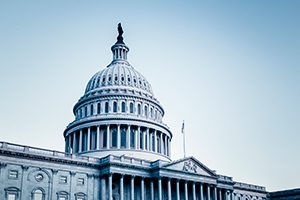December Policy Roundup: Paid Leave Policy, Pregnant Workers Fairness Act Regulations, and Workforce Development Initiatives
 Through December and into the new calendar year, federal government leaders kept busy with Congressional hearings and markups, new legislation, and proposed and final rules focusing on issues that may be of significance to higher education HR professionals. CUPA-HR tracked several actions from both Congress and federal agencies on issues including paid family leave, short-term Pell Grants, the Pregnant Workers Fairness Act, and workforce development.
Through December and into the new calendar year, federal government leaders kept busy with Congressional hearings and markups, new legislation, and proposed and final rules focusing on issues that may be of significance to higher education HR professionals. CUPA-HR tracked several actions from both Congress and federal agencies on issues including paid family leave, short-term Pell Grants, the Pregnant Workers Fairness Act, and workforce development.
House Education and Workforce Committee Markup
On December 12, 2023, the House Committee on Education and the Workforce held a full committee markup on H.R. 6585, the Bipartisan Workforce Pell Act, and H.R. 6655, A Stronger Workforce for America Act.
The Bipartisan Workforce Pell Act aims to amend the Higher Education Act of 1965, allowing students to use Pell Grants for eight-week or longer educational programs. This bill also establishes quality control measures for Pell initiatives, enabling higher education institutions to participate if they meet specific criteria. The committee voted to move the legislation out of committee with 37 members voting in favor and 8 members voting against the bill.
The next bill, A Stronger Workforce for America Act, seeks to renew and enhance the Workforce Innovation and Opportunity Act (WIOA). Originally established in 2014, WIOA has been extended through yearly appropriations since fiscal year 2021. The bill incorporates multiple measures to modernize WIOA, bolstering the country’s workforce development to better equip and retain workers. The bill passed through the committee with bipartisan support; 44 members voted in favor of and only one member voted against it.
Paid Leave Request for Information
On December 13, the Congressional Bipartisan Paid Family Leave Working Group published a Request for Information (RFI) for diverse stakeholder input to aid in the expansion of access to paid parental, caregiving, and personal medical leave nationwide. The members encouraged interested stakeholders to submit letters that answer these ten questions on the role the federal government can play in creating a national paid leave program.
Responses must be submitted by January 31, 2024, and can be directed to [email protected], [email protected], [email protected], and [email protected]. CUPA-HR will continue to track developments and intends to collaborate with associate organizations to submit feedback on an as-needed basis.
National Apprenticeship System Enhancement Proposed Rule
On December 14, the Department of Labor (DOL) unveiled a proposed rule to modernize the regulations for Registered Apprenticeship programs. The 779-page proposal focuses on provisions to create “safeguards for apprentices to ensure that they have healthy and safe working and learning environments as well as just and equitable opportunities throughout their participation in a registered apprenticeship program,” while also creating baseline requirements for career and technical education apprenticeships, which would target high school and postsecondary students to programs that align more closely with programs found at institutions of higher education.
DOL is providing a 60-day comment period for the proposed rule, which will commence once the regulation is posted in the Federal Register. CUPA-HR is analyzing the rule and will coordinate with other higher education associations as needed to file comments.
Federal Transit Authority General Directive on Assaults on Transit Workers
On December 20, the Department of Transportation (DOT)’s Federal Transit Administration (FTA) proposed a General Directive to address the ongoing national safety risk concerning assaults on transit workers. Transit agencies falling under FTA’s Public Transportation Agency Safety Plans directive would be instructed to conduct safety risk assessments, identify mitigation strategies, and report discoveries to FTA. Per the Bipartisan Infrastructure Law, transit agencies operating in urban areas must collaborate with the joint labor-management safety committees to reduce safety hazards.
The deadline for submitting comments in the Federal Register is February 20, 2024, but late submissions may be considered. CUPA-HR is working with members and other higher education associations to determine the impact that this directive may have on transportation and HR services at institutions of higher education.
Regulations to Implement the Pregnant Workers Fairness Act
On December 27, the Equal Employment Opportunity Commission (EEOC) sent its final rule to implement the Pregnant Workers Fairness Act (PWFA) to the Office of Information and Regulatory Affairs (OIRA) for review prior to its publication in the Federal Register. The final rule will likely look very similar to the proposed rule that was issued in August 2023, which provides a framework for how the EEOC plans to enforce protections granted to pregnant workers under the PWFA.
The EEOC was tasked by law with finalizing regulations to implement the PWFA by December 29, 2023. Given the missed deadline, OIRA may move quickly on its review of the regulations, and we could see the final rule published sometime between late January and late February. CUPA-HR is continuing to monitor for any updates and will keep members apprised of any new details that may arise in the final rule.


